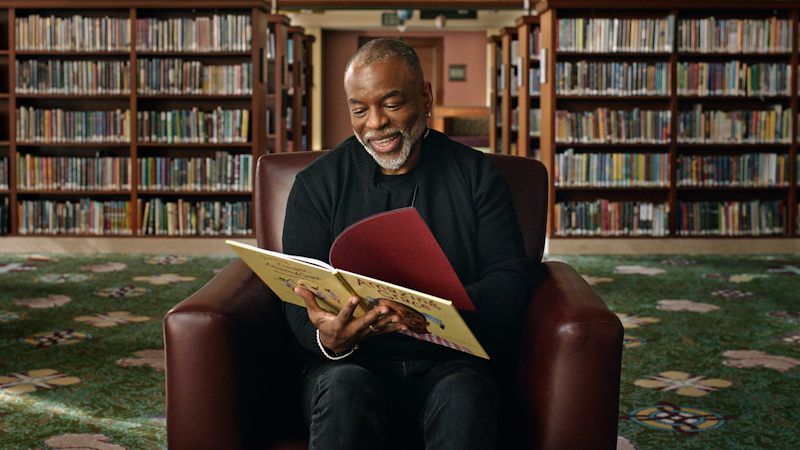If you’re Gen X or Millennial (or a parent of either) you probably spent the 1980s and 90’s watching Reading Rainbow and its host LeVar Burton on PBS. The show was a fun mashup of mini-documentary segments, book readings often by celebrities, and kid-recommended reviews.
The opening notes of the theme song are enough to bring forth nostalgia, and the aforementioned generations were moved by it in the movie theater where I watched Butterfly in the Sky, directed Bradford Thomason and Brett Whitcomb.
The documentary’s a delight for anyone who grew up watching LeVar’s endearing and captivating delivery as the host of a show that opened portals to worlds unknown via books.
Rainbow’s gem idea began as a supposed antidote to mindless television. I spent years watching it, transfixed by the host and the kids’ often unintentionally hilarious book recommendations—they came from throughout the country, from all walks of life and made me feel part of some nine-year-old community of bookworms and nerds.
The documentary’s premise isn’t without flaws. It wants to take credit for being the first. But The Electric Company and Sesame Street all promoted literacy, and Mister Rogers already had docu-style segments. Some shows that didn’t last also tackled the reading books aloud. I recall a segment on a show where a painter recreated scenes from children’s books while a narrator read chapter after chapter. Daniel Pinkwater’s Lizard People was particularly hallucinatory.
The value of these shows can’t be overestimated. 3-2-1 Contact’s profile of synth pioneer Wendy Carlos Williams is part of the reason I started my music project Fault Tolerant. Reading Rainbow’s storytelling was also an unconscious influence on my decision to become a writer.
The documentary’s highlights include the music director showing how he composed the theme song (that electronica band The Octopus Project provided additional sounds is a nice touch), not to mention the lengths the producers went to bring segments to life. It’s inspiring to hear from the show’s creators, who were almost all inexperienced when they began and somehow cobbled together a long-endearing series that changed peoples’ lives.
Black children saw themselves in LeVar Burton and envisioned a brighter future. That he went from Roots to Reading Rainbow makes sense; at the heart of both was the desire to educate.
The overarching flaw of the film is it tries too hard to generate drama for the purposes of storytelling. Burton’s decision to join the cast of Star Trek: Next Generation had little impact. Burton’s adamancy regarding changing facial hair with each season despite the wishes of the creators sounds stupid in retrospect. The directors even try to paint Republicans as boogeymen who threatened to defund public television in the mid-1990s but ultimately didn’t. I question how small their budgets really were if they were flying all over the world to stand in front of volcanoes, visiting Montserrat or exploring bat caves in Texas.
Where Butterfly In The Sky really fails to connect the dots is the reason for its ultimate demise. The directors suggest changing tastes and the rise of personal computers were the main reason, but it could be said that the creators failed to adapt with technology. They point out that Sesame Street did incredibly well regarding licensing so that show was never on the chopping block. Imagine if Reading Rainbow created its own publishing imprint and sold books and merch to supplement its budgets? A hugely missed (and well-meaning) opportunity if ever there was one.
It’s also obvious that the show became less about a place for children to let their imagination run wild and more about dealing with real world issues. LeVar’s 9/11 segment was misguided in retrospect. It’s a show for nine-year-olds. Reading Rainbow wanted to be seen in the same light as Mister Rogers, and while Fred Rogers did cover death in a notable episode, he reserved his 9/11 messages for adults.

